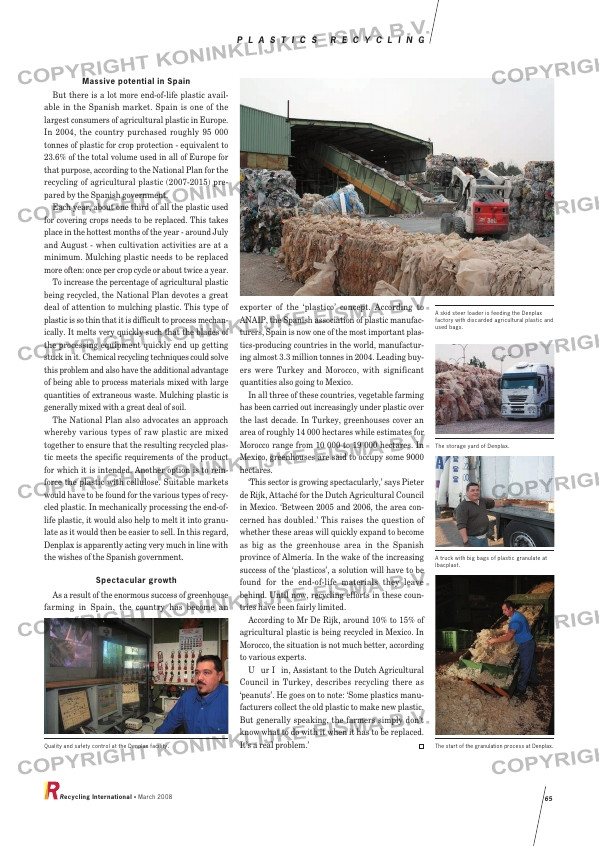Page 65 from: March 2008

exporter of the ‘plastico’ concept. According to
ANAIP, the Spanish association of plastic manufac-
turers, Spain is now one of the most important plas-
tics-producing countries in the world, manufactur-
ing almost 3.3 million tonnes in 2004. Leading buy-
ers were Turkey and Morocco, with significant
quantities also going to Mexico.
In all three of these countries, vegetable farming
has been carried out increasingly under plastic over
the last decade. In Turkey, greenhouses cover an
area of roughly 14 000 hectares while estimates for
Morocco range from 10 000 to 19 000 hectares. In
Mexico, greenhouses are said to occupy some 9000
hectares.
‘This sector is growing spectacularly,’ says Pieter
de Rijk, Attaché for the Dutch Agricultural Council
in Mexico. ‘Between 2005 and 2006, the area con-
cerned has doubled.’ This raises the question of
whether these areas will quickly expand to become
as big as the greenhouse area in the Spanish
province of Almería. In the wake of the increasing
success of the ‘plasticos’, a solution will have to be
found for the end-of-life materials they leave
behind. Until now, recycling efforts in these coun-
tries have been fairly limited.
According to Mr De Rijk, around 10% to 15% of
agricultural plastic is being recycled in Mexico. In
Morocco, the situation is not much better, according
to various experts.
U ur I in, Assistant to the Dutch Agricultural
Council in Turkey, describes recycling there as
‘peanuts’. He goes on to note: ‘Some plastics manu-
facturers collect the old plastic to make new plastic.
But generally speaking, the farmers simply don’t
know what to do with it when it has to be replaced.
It’s a real problem.’
P L A S T I C S R E C Y C L I N G
Recycling International • March 2008 65
Massive potential in Spain
But there is a lot more end-of-life plastic avail-
able in the Spanish market. Spain is one of the
largest consumers of agricultural plastic in Europe.
In 2004, the country purchased roughly 95 000
tonnes of plastic for crop protection – equivalent to
23.6% of the total volume used in all of Europe for
that purpose, according to the National Plan for the
recycling of agricultural plastic (2007-2015) pre-
pared by the Spanish government.
Each year, about one third of all the plastic used
for covering crops needs to be replaced. This takes
place in the hottest months of the year – around July
and August – when cultivation activities are at a
minimum. Mulching plastic needs to be replaced
more often: once per crop cycle or about twice a year.
To increase the percentage of agricultural plastic
being recycled, the National Plan devotes a great
deal of attention to mulching plastic. This type of
plastic is so thin that it is difficult to process mechan-
ically. It melts very quickly such that the blades of
the processing equipment quickly end up getting
stuck in it. Chemical recycling techniques could solve
this problem and also have the additional advantage
of being able to process materials mixed with large
quantities of extraneous waste. Mulching plastic is
generally mixed with a great deal of soil.
The National Plan also advocates an approach
whereby various types of raw plastic are mixed
together to ensure that the resulting recycled plas-
tic meets the specific requirements of the product
for which it is intended. Another option is to rein-
force the plastic with cellulose. Suitable markets
would have to be found for the various types of recy-
cled plastic. In mechanically processing the end-of-
life plastic, it would also help to melt it into granu-
late as it would then be easier to sell. In this regard,
Denplax is apparently acting very much in line with
the wishes of the Spanish government.
Spectacular growth
As a result of the enormous success of greenhouse
farming in Spain, the country has become an
A skid steer loader is feeding the Denplax
factory with discarded agricultural plastic and
used bags.
Quality and safety control at the Denplax facility. The start of the granulation process at Denplax.
The storage yard of Denplax.
A truck with big bags of plastic granulate at
Ibacplast.
RI_049 Plastic RI SPAIN:Opmaak 1 28-02-2008 11:55 Pagina 65



